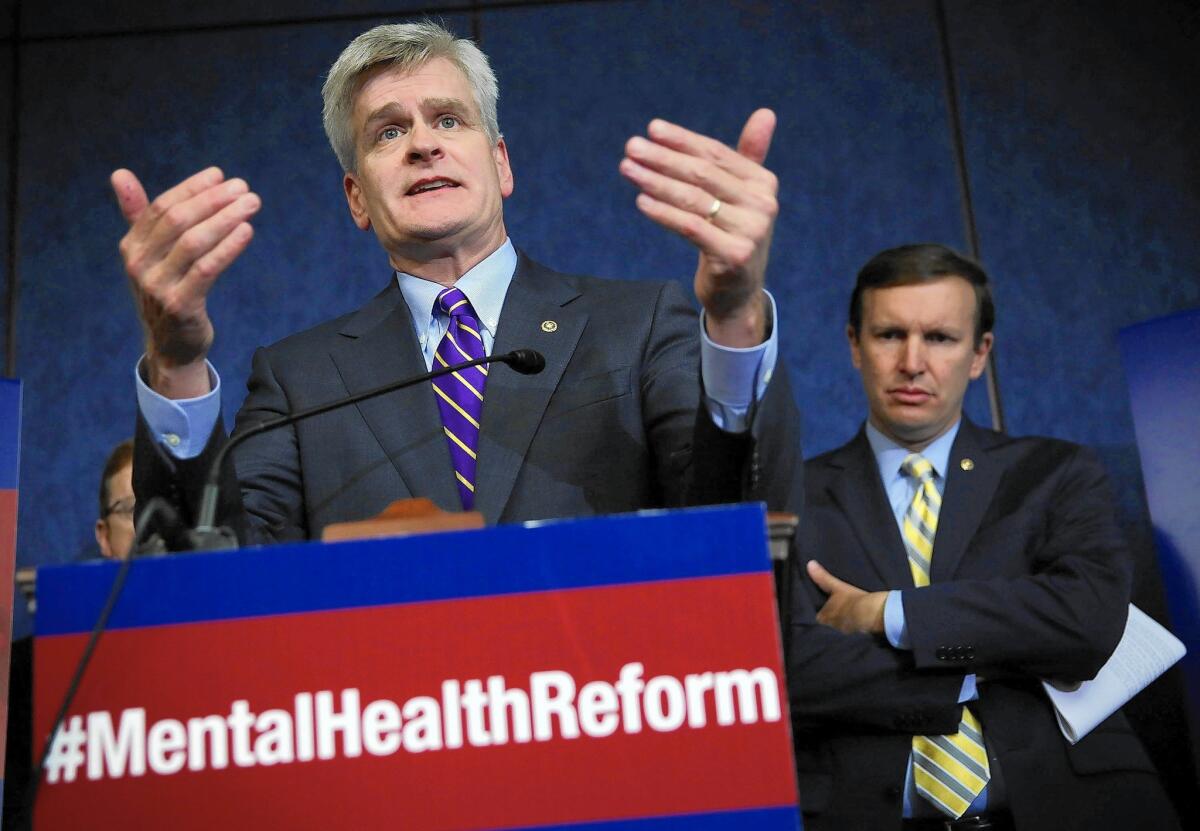Despite bipartisan support, mental health reform bill could be derailed

- Share via
Reporting from WASHINGTON — Mental health advocates are pressing Democrats and Republicans on Capitol Hill not to abandon a push to modernize the nation’s ailing mental health system amid rising partisan tensions over President Obama’s Supreme Court pick.
The effort has picked up crucial bipartisan support in the Senate and galvanized dozens of groups representing patients, physicians and state and local leaders. The Obama administration has also backed calls for reform, proposing more than $500 million in new federal spending to expand mental health services nationwide.
But election-year politics and uncertainty over funding are fueling concerns that years of collaborative work by lawmakers from both parties may not bear fruit.
“We don’t often get opportunities like this,” said Paul Gionfriddo, president of Mental Health America, a leading national advocate. “This is the year for action.”
An estimated 1 in 5 Americans suffered from a mental illness in the last year, according to federal data. Nearly 10 million people have a serious disease such as schizophrenia or bipolar disorder.
But the U.S. has long had a patchwork system of mental health care that leaves tens of millions of people without access to vital services. By one estimate, more than half of U.S. adults with a mental illness do not receive treatment.
Inadequate community services and too few psychiatric hospitals are widely seen as major factors in epidemic levels of homelessness and incarceration among the mentally ill.
“Our mental health system is broken,” said Sen. Bill Cassidy (R-La.), who is among a bipartisan group of senators pushing to modernize the system.
Last month, the Senate Health Committee advanced a package of bills that, among other things, should strengthen a 2008 law that requires health insurers to cover mental health services at the same level they cover treatments for physical health conditions.
The so-called parity law extended new protections to the mentally ill, but minimal enforcement by state and federal regulators has left in place substantial barriers for patients with mental health and substance abuse conditions, advocates say.
The new Senate legislation also is designed to ease communication between health providers and families of mentally ill patients by clarifying privacy protections in federal law.
And the bills would push the federal Substance Abuse and Mental Health Services Administration to more rigorously analyze whether programs the agency funds are working.
Angela Kimball, policy director for the National Alliance on Mental Illness, said the legislation represented “a significant step in the right direction.”
The legislative push has also attracted unusually broad support from Democrats and Republicans. The Senate mental health bill — developed by a group of lawmakers including Senate Health Committee Chairman Lamar Alexander (R-Tenn.) and its senior Democrat, Patty Murray of Washington — drew unanimous support in the committee this month.
“This is an incredibly important bipartisan foundation,” said Sen. Christopher S. Murphy (D-Conn.), one of the architects of the legislation.
But many say substantially more is needed. “We are hoping Congress embraces much wider reforms,” Kimball said. “Congress could show its ability to not only forge bipartisan agreement, but also act expansively and decisively.”
Most pressing, advocates say, is more money for community-based services such as mental health clinics, housing and crisis response teams.
“These are the services that enable people to have better lives,” said Jennifer Mathis, program director at the Bazelon Center for Mental Health Law.
“They also save money,” she added, noting that jailing mentally ill patients or treating them in emergency rooms or psychiatric hospitals after they have a breakdown is far more costly.
In response to a question about the need for more money, Alexander said the Senate Appropriations Committee would have to consider funding later this spring. But he made no commitments.
This month, Senate Republicans rejected calls to appropriate new money for drug treatment programs, even as lawmakers passed a sweeping bill to respond to the widening epidemic of heroin and opioid abuse.
The environment in the House may be even more challenging for mental health legislation.
Although House Speaker Paul D. Ryan (R-Wis.) has signaled interest in advancing a reform bill, a House version of the Senate bill has been stalled for months, in part over opposition from some GOP lawmakers to increased funding.
At the same time, the House Budget Committee last month approved a budget blueprint that would slash federal spending by about $6.5 trillion over the next decade, including rolling back Medicaid health insurance coverage for millions of poor Americans.
Medicaid — which was expanded under the 2010 Affordable Care Act, also known as Obamacare — is the single largest payer for mental health services in the country.
More to Read
Get the L.A. Times Politics newsletter
Deeply reported insights into legislation, politics and policy from Sacramento, Washington and beyond. In your inbox three times per week.
You may occasionally receive promotional content from the Los Angeles Times.











